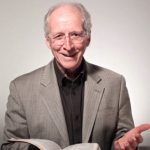 Bryan Chapell: (original source here)
Bryan Chapell: (original source here)
The Bible declares its main message right at the dawn of human history: After God made all things “good,” everything went bad as a consequence of the evil that entered the world through human sin. In order for everything to be made right again, God designed a plan to rescue humanity and the broken world from sin’s corruptions. He told Satan, who first tempted humanity to sin:
I will put enmity between you and the woman, and between your offspring and her offspring; he shall bruise your head, and you shall bruise his heel. (Gen. 3:15)
These emblematic words, sometimes called the “First Gospel,” are God’s inaugural announcement of the solution he will provide for humanity’s sinful predicament. They also establish the theme for the rest of Scripture. From this point forward, the great battle unfolds between the offspring of Satan (his evil forces) and the offspring of the woman (God’s appointed Redeemer), and the outcome of the conflict is certain: Satan will wound the Redeemer (“bruise his heel”), but the Redeemer will deal Satan a mortal blow (“he shall bruise your head”).
God will graciously provide a divine deliverance from the human dilemma.
All About Christ
This theme of gracious provision is the context of all that follows in the Bible. All the subsequent history and messages of Scripture are elements in this unfolding story of divine rescue. Every battle, famine, disease, betrayal, enslavement, and evil is Satan’s attempt to hinder the work of the offspring of Eve coming to crush him. And every rescue of the weak, provision for the needy, maintenance of a remnant, restoration of the broken, protection of the defenseless, pardon of the prodigals, forgiveness of the faithless, preservation of a people, covenant with the undeserving, supply of beauty for ashes, and mercy for the repentant is an expression of the grace that will culminate in the victory of the divinely appointed Redeemer.
God doesn’t intend for this divine crusade of redemption merely to interest us. As the apostle Paul writes, “Whatever was written in former days was written for our instruction, that through endurance and through the encouragement of the Scriptures we might have hope” (Rom. 15:4). The history, poetry, symbols, and instructions of Scripture vary greatly in style but not in their intention: all are intended to affect our response to life in our fallen world. Though evil is always present and frequently prevails, we are not to despair. With a patient confidence in God’s ultimate providence, and the assurance of the Scriptures that his redemption is ongoing, we always have hope. Continue reading

